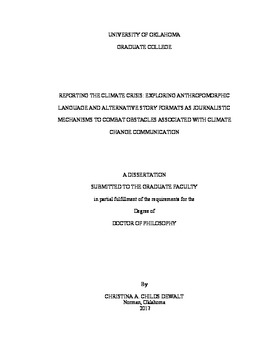| dc.contributor.advisor | Gade, Peter | |
| dc.contributor.author | DeWalt, Christina A. Childs | |
| dc.date.accessioned | 2017-06-21T12:45:42Z | |
| dc.date.available | 2017-06-21T12:45:42Z | |
| dc.date.issued | 2017 | |
| dc.identifier.uri | https://hdl.handle.net/11244/51560 | |
| dc.description.abstract | Reporting on climate change has been a special challenge for journalists, but new approaches to storytelling may help curb some of the inherent confounds found in environmental discourse. Through experimental analysis, this study provides insights into how anthropomorphic language (assigning human characteristics to non-human agents) and non-linear digital news story formatting can impact online media users’ message retention, attitudes toward climate change, and willingness to take action to reduce the effects of global warming. This research asks simple – yet conceptually profound questions – whether journalists can adopt different story forms and literary elements (anthropomorphic language) and new digital tools (non-linear formatting) to present information that creates greater engagement and moves people past their existing dispositions to consider information in a fresher (less-biased) light.
Keywords: climate change, anthropomorphism, digital storytelling, environmental journalism | en_US |
| dc.language | en_US | en_US |
| dc.subject | Journalism, Climate Change, Digital News, Anthropomorphism | en_US |
| dc.title | REPORTING THE CLIMATE CRISIS: EXPLORING ANTHROPOMORPHIC LANGUAGE AND ALTERNATIVE STORY FORMATS AS JOURNALISTIC MECHANISMS TO COMBAT OBSTACLES ASSOCIATED WITH CLIMATE CHANGE COMMUNICATION | en_US |
| dc.contributor.committeeMember | Craig, David | |
| dc.contributor.committeeMember | Miller, Claude | |
| dc.contributor.committeeMember | Beard, Fred | |
| dc.contributor.committeeMember | Loke, Jaime | |
| dc.date.manuscript | 2017-06-13 | |
| dc.thesis.degree | Ph.D. | en_US |
| ou.group | Gaylord College of Journalism and Mass Communication | en_US |
